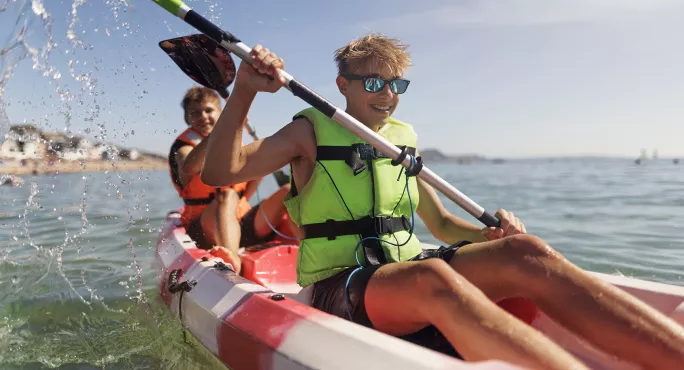Summer safety: 5 topics to discuss with pupils

As the summer holidays approach, the thought of six weeks of freedom will be at the front of many teachers’ minds - and students’, too. After all, for young people the summer holidays are a time for fun and rite-of-passage moments - from attending events with friends to holidaying abroad, going to festivals and more.
This is all good and it is important for them to enjoy themselves - but as teachers we can play a key role in trying to help ensure that these activities pass by safely.
While we don’t want to scaremonger or put children off taking part, it is never a bad idea to use these final weeks of the year to touch on how to stay safe in the kind of activities and events that they may participate in over the summer.
Helping to keep students safe this summer
1. Staying alert and aware
With the freedom of summer, young people often spend more time outdoors, going out socialising with friends and exploring new places, meeting new people.
While this is exactly what summer is about, it is important to remind students to make sure that they don’t switch off entirely when enjoying themselves and to remain aware of their surroundings, particularly when in an unfamiliar area. They should stick together with friends, especially at night.
They should trust their instincts if something feels off. It’s worth suggesting that they agree a specific word of phrase with their parents or friends that they can send discreetly if something is wrong and they need picking up.
2. Festival plans
For many young people, music festivals are the high points of their social calendar. However, it is important to talk to them about how to stay safe at these very large events that they won’t have experienced before.
Festivals usually have a support network and designated medical tents and meeting points. It is worth telling your students to look into this before attending and generally familiarise themselves with the layout of the festival grounds.
It is important to remind them, as well, of the importance of looking out for one another, staying in groups and knowing where to seek help if needed. Encouraging them to think about what they would do if their phone had no charge or signal at the event is also not a bad idea.
3. Drink spiking
Sadly, drink spiking remains a danger. It is worth reminding students of the importance of never leaving drinks unattended and to only accept drinks from friends or directly at the bar.
Inform young people about the potential symptoms of having their drink spiked, such as sudden dizziness, confusion or feeling significantly more intoxicated than expected.
Make them aware of schemes like Ask for Angela so they know they can help from bar staff.
4. Digital safety
While summer is a time for relaxing, it is easy for young people to fall into the trap of excessive screen time, whether through gaming or using social media.
This could lead to problems such as giving out personal information or even sharing intimate pictures - sextortion scams involving threats to share nude pictures are increasingly common.
All age groups and genders are targeted in these scams, but a large proportion of cases have involved male victims aged 14 to 18.
5. Staying safe around water
Sadly, we often hear news reports in the summer about young people drowning when swimming at unsupervised locations or in dangerous bodies of water. Make it clear to pupils that they should only swim in designated areas where lifeguards are present.
It is also worth making sure that they understand that swimming conditions can be very different to what they can see: there can be hidden rip tides, sea conditions can change and the tide can come in faster than you expect.
Overall, we want our young people to have a wonderful summer break and enjoy all of the opportunities they can. But we also want to ensure that they come back safe and sound ready for the next academic year or to continue their path to university, a new career or that well-earned gap year.
If even one piece of advice given in these final weeks of term helps do that, then it’s all worthwhile.
Luke Ramsden is deputy head of an independent school and chair of trustees for the Schools Consent Project
For the latest education news and analysis delivered directly to your inbox every weekday morning, sign up to the Tes Daily newsletter
You need a Tes subscription to read this article
Subscribe now to read this article and get other subscriber-only content:
- Unlimited access to all Tes magazine content
- Exclusive subscriber-only stories
- Award-winning email newsletters
Already a subscriber? Log in
You need a subscription to read this article
Subscribe now to read this article and get other subscriber-only content, including:
- Unlimited access to all Tes magazine content
- Exclusive subscriber-only stories
- Award-winning email newsletters
topics in this article



